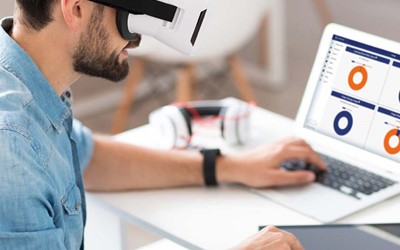How can VR be used to train your employees
Virtual Reality (VR) is changing the way organisations train their staff. By simulating real workplace scenarios, VR training helps employees safely practise practical and soft skills - before they ever step into the role.
Posted 7 September 2022
What is VR training?
VR training uses immersive, computer-generated environments to replicate real - world situations. Staff can learn how to operate equipment, communicate with customers, or manage emergencies - all in a safe and controlled space.
This form of training can also be used to assess potential employees for skills, knowledge and aptitude before they’re hired.
What can employees learn through VR?
VR is a flexible training tool with a wide range of applications. It’s currently being used to help employees:
- Operate new machinery and equipment
- Follow processes more accurately and efficiently
- Improve customer service and manage complaints
- Build empathy towards customers and colleagues
- Handle difficult conversations
- Present and communicate clearly
- Develop leadership skills
- Respond to emergencies
- Increase confidence in sales and negotiations
Employees trained through VR often need less supervision, perform better in their current roles, and progress faster in future ones.
Why VR works for practical and soft skills
Practical skills are physical or technical abilities like operating tools or machinery.
Soft skills include communication, leadership, time management and emotional intelligence.
VR supports both types of learning by allowing users to practise real-world actions and interpersonal scenarios. For example, someone might learn to use industrial machinery or practise delivering difficult feedback - all within a VR headset.
Benefits of VR training
- Safe and risk - free environment
- Realistic and engaging experience
- Instant feedback and performance tracking
- Scalable and location - independent
- Suitable for new hires and existing staff
Even for roles that don’t involve physical risk, VR adds value. For instance, customer service teams use VR to rehearse handling tough calls without the pressure of real customer interactions.
The future of workforce training
VR is a powerful tool for employee development. Whether it’s onboarding new hires, developing managers, or upskilling current staff, VR offers an engaging way to learn, practise, and grow.
30-day FREE Trial of eNetReality
Start your VR experience today and begin to quickly develop and create your own fully-immersive assessments - no coding required!
Recent Posts
White-labelling: The secret to training learners actually trustTurning AI into potential gain
Seamless HR Integration: Streamlining workforce enrolment with eCom's eNet Product Suite
eCom Learning Solutions: Staying ahead in a constantly evolving landscape
Is your work changing, or just your tools? A question for the modern workforce



